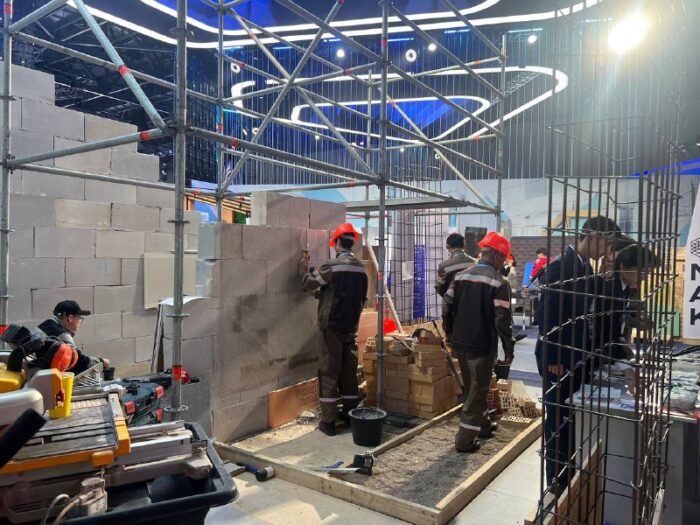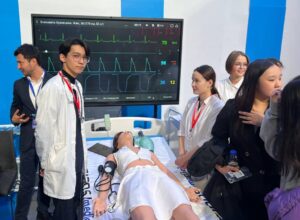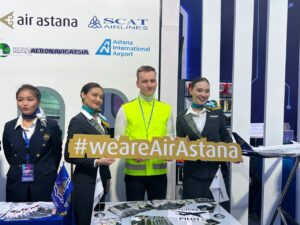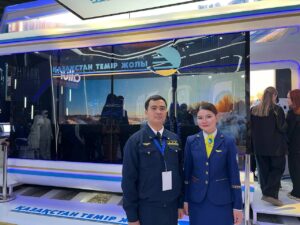ASTANA—The City of Working Professions festival commenced in the capital on Feb. 11 as part of President Kassym-Jomart Tokayev’s Year of Working Professions initiative. The event, which runs through Feb. 15, promotes vocational education through industry-themed exhibits, job fairs, hackathons, startup presentations, and hands-on training.

The City of Working Professions festival. Photo credit: Nagima Abuova / The Astana Times
“One of the key events of the Year of Working Professions will be the internationalization of ten colleges in the country. The main goal is to increase their competitiveness at the global level and bring educational programs in line with international standards,” said Minister of Education Gani Beisembayev.
According to the ministry, the initiative will incorporate Hungary’s expertise in training nuclear energy specialists and China’s experience in IT and drone design. Starting Sept. 1, 2025, per capita funding for colleges will double. Currently, 518 enterprises provide patronage to colleges, and this number is planned to expand to 4,000.
Additionally, a National Competence Center will be established in Astana to support students in technical and vocational education. Similar centers operate in China, South Korea, and the United Arab Emirates.
Festival highlights and industry engagement

Visitors can explore career paths, attend workshops, and engage in hands-on demonstrations using industry-standard equipment. Photo credit: Nagima Abuova / The Astana Times
The festival, organized by the Ministry of Education, features interactive zones representing key industries, including mining and metallurgy, mechanical engineering, transportation, agriculture, water management, construction, emergency services, and emerging professions. Visitors can explore career paths, attend workshops, and engage in hands-on demonstrations using industry-standard equipment.
A series of events, including seminars, master classes, a hackathon on energy and oil industry topics, a job fair, startup presentations, and internationally accredited training sessions, will take place throughout the week.
“The areas featuring more than 200 specialties allow the younger generation to explore career paths and gain insight into different industries. With technological advancements reshaping professions, young people now have the chance to reconsider their choices. One may have initially been drawn to digital technologies but later developed an interest in the energy sector or mining, realizing the importance of safety measures and innovations like drone technology,” President of the Talap nonprofit joint stock company (NJSC) under the Ministry of Education Sanzhar Tatibekov told The Astana Times.

Air Astana’s Aviation House features flight simulators for aspiring aviation professionals. Photo credit: Nagima Abuova / The Astana Times
Sharing his sentiment, Laura Alikulova, head of Talap’s WorldSkills movement development department, emphasized the initiative’s broader impact.
“The Year of Working Professions highlights the importance of skilled workers in our economy. These professions—whether in construction, healthcare, or technology—are the foundation of progress,” said Alikulova.
“This initiative brings many advantages: stable employment and good salaries, economic growth driven by a strong workforce, career advancement opportunities, and increased societal respect for skilled labor. More scholarships and training programs make these careers more accessible,” she added.
Hands-on learning and career opportunities

Zhasulan Zhanarystan, a duty officer at Nurly Zhol train station in Astana (on the right). Photo credit: Nagima Abuova / The Astana Times
The festival’s interactive format allows visitors to explore career opportunities firsthand. Among the exhibits, Air Astana’s Aviation House features flight simulators for aspiring aviation professionals. Kazakhstan Temir Zholy presented a locomotive mock-up, giving attendees an inside look at railway professions.
“After graduating from the Kazakh Academy of Transport and Communications in Almaty, I started my career in Astana. Our company offers real career growth, and I always dreamed of working in the railway sector, following in my family’s footsteps,” said Zhasulan Zhanarystan, a duty officer at Nurly Zhol train station in Astana.
The Allur Group showcased opportunities in automotive production, emphasizing partnerships with local motor transport colleges. Azat Abishev, chief specialist of the recruitment and adaptation department at Allur, highlighted the company’s collaboration with the Kostanai College of Motor Transport in training future automotive professionals.

Azat Abishev, chief specialist of the recruitment and adaptation department at Allur. Photo credit: Nagima Abuova / The Astana Times
“Students can begin their training with us and advance to leadership positions. We also offer grants for higher education, allowing employees to develop their skills while working,” said Abishev.
At the event, Allur’s booth features simulators where visitors can try assembling an engine, disassembling components, and welding. “Here we offer machine contact welding, a method used in the automotive, shipbuilding, and aerospace industries, available at only two factories in Kazakhstan, one of which is ours,” said Abishev.
Shynggys Nurgozhayev, the director of Taldykorgan High Polytech College, highlighted the growing significance of drone technology and the college’s role in training specialists in this field.
“We train drone operators, and our booth features several types of drones designed for various applications. One model is focused on agriculture, helping analyze and treat fields. It can identify crop types, detect weeds and pests, and calculate the necessary amount of pesticides per hectare,” said Nurgozhayev, noting that unlike traditional tractors, which can damage crops during pesticide application, drones ensure precise and effective treatment, ultimately increasing yields.

Shynggys Nurgozhayev, the director of Taldykorgan High Polytech College in an interview with The Astana Times. Photo credit: Nargiz Raimbekova / The Astana Times
Another type of drone showcased at the event is designed for emergency response and is equipped with thermal imagers and sensors.
“These drones assist rescue services by detecting people in smoke-filled areas, forests, or urban environments with limited visibility. When conventional helicopters and planes struggle to locate people, our drones provide accurate heat signatures, helping rescuers reach those in need quickly and efficiently,” Nurgozhayev said.
The college’s training goes beyond drone operation, offering a comprehensive program that includes drone assembly and maintenance.
“At Taldykorgan Polytechnic College, we do not just train drone operators; we also teach students to design, build, and service drones. We have a specialized production line where students learn assembly techniques, mirroring real-world manufacturing processes. This prepares them for careers as operators, designers, and technicians, filling a crucial gap in the labor market,” Nurgozhayev said.
He noted that the demand for drone specialists will continue to grow in the coming years, with companies increasingly relying on these technologies.
